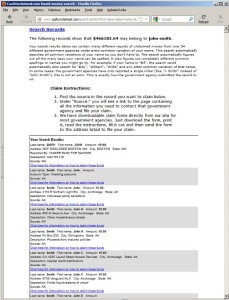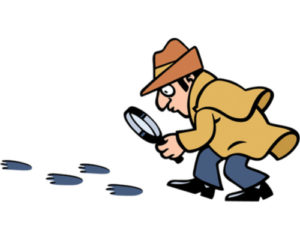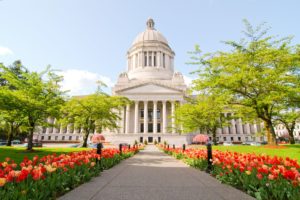If you look around the site you will come across many comments from people looking for their unclaimed money.
I’ve received many, many more emails from people also looking for their unclaimed money.
I would truly like to help as many people as I can, but it is just impossible time-wise with everything else else going on in life, not to mention running a business!
Sometimes I feel like Jim Carrey in Bruce Almighty when he has to answer everyone’s prayers. See the below video to see what I’m talking about.
You see, as unclaimed money finders, we don’t look for a person first and then do a search to see if they have money.
We actually do the complete opposite. We check a database of people owed money, then we search for the person owed the money. This way we already know that they have money coming to them and we just need to make them aware of that.
However, we realize that a lot of people are coming to the site looking for their own unclaimed money.
Because of that, we have teamed up with a company called CashUnclaimed.com to help you with your search.
CashUnclaimed is a private source of unclaimed money records from all 50 states & many Federal agencies.
They have a huge variety of sources. So instead of having to search dozens of government sites to find your money – you can search all these records from one location on their site.
When you perform a free trial search they display the total dollar amount in unclaimed funds that they show reported by the appropriate government agencies. This does not guarantee that this money is 100% absolutely yours.
What it means is that there is that total dollar amount shown by government agencies under your name and common variations of your name. It means there are funds matching your name and they are eligible to be claimed.
The dollar total they display is the actual total amount they have listed in their database. You will need to perform your own due-diligence & verify these funds listed are for you and not for someone else who shares a name with you.
Their optional paid premium subscription goes FAR beyond a simple database search. They will help you with the entire claims process! They provide complete instructions, guides, sample claim forms & instructional ebooks to assist you with the claims process. They even provide a live session with an asset recovery specialist to help you through what can be a complicated & confusing process.
CashUnclaimed.com contains one of the largest databases for unclaimed money in the world. Their current database lists billions of dollars in unclaimed money, property, accounts and assets from all 50 states and several Federal agencies that could belong to you.
They are not an unclaimed property locator service (as we are) and do not charge you a percentage of the money you claim (as we do).
Here’s an example of their paid member’s search:
They also offer a free trial search on their homepage that lets you take a “sneak peek” inside our database. These records are limited and do not show you the full information needed to submit a claim. In order to unlock the full information about these records you must purchase a premium subscription.
Cash Unclaimed Money Search charge a very small fee to help cover their expenses. Access to their help, services and search tools range from $11 to $129 depending on which services you decide to order. Depending on how many lost money searches you perform, you could pay just pennies per unclaimed money search.
They currently offer 3 payment options:
1-Time Payment for 12 months of access
1-Time Payment for lifetime access
Monthly Automatic Recurring Subscription that renews automatically every month until you cancel. You can cancel at any time by visiting their Support Desk & following the simple instructions.
If your name is listed, you will have to contact the institution listed as holding the money. They do not claim your money for you. You must do that. In addition to filling out a claim form, proof of ID will be need to be provided to whichever agency is holding your money – most likely one or more of the following:
Social Security Number
Birth Certificates
Marriage Certificates
Death Certificates
Proof of Previous Addresses
Identification such as Drivers Licenses or Passports.
If you are interested in getting started with CashUnclaimed.com and looking for your own unclaimed money then click on the coupon below:



